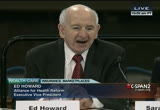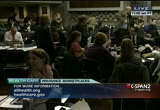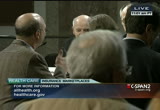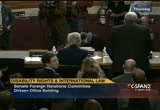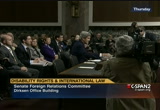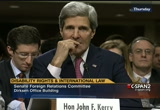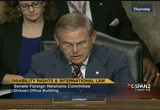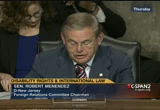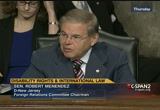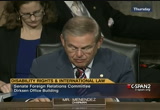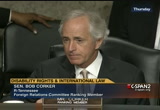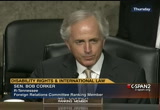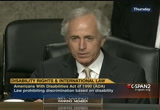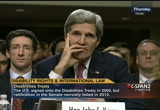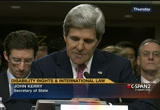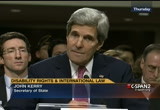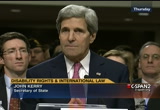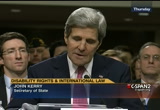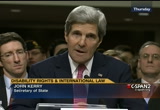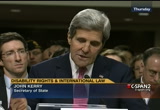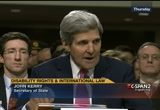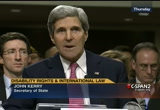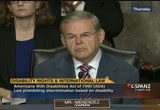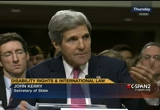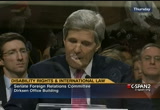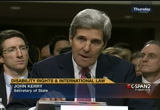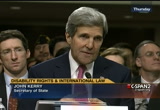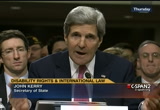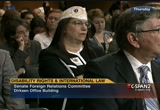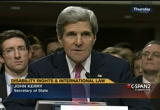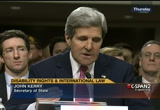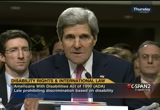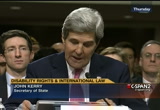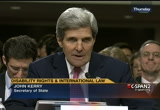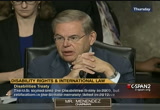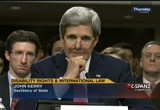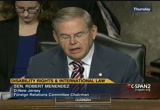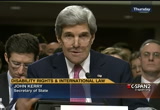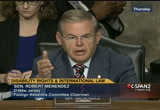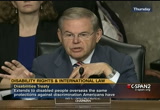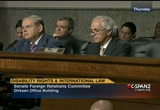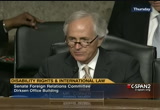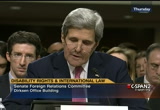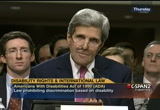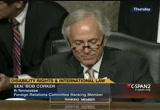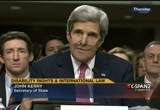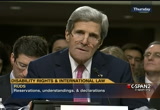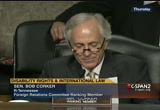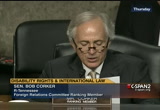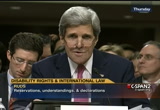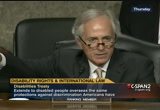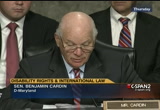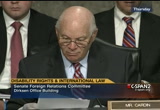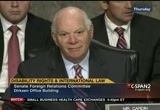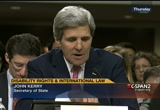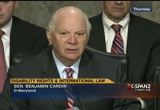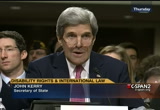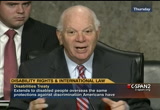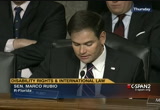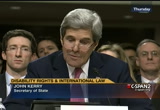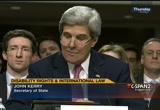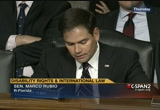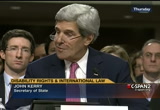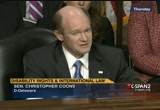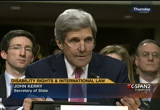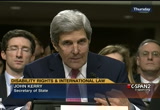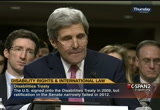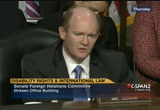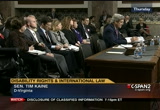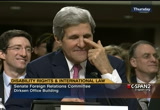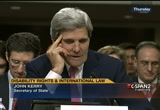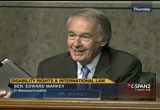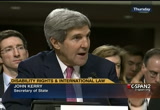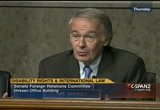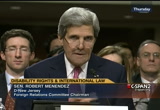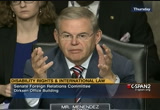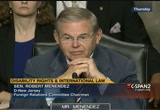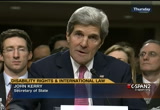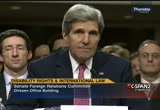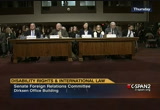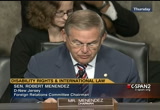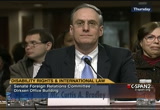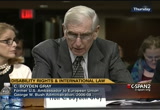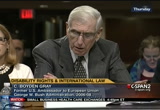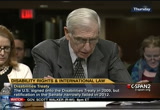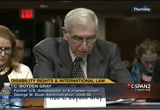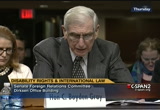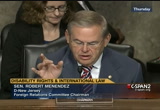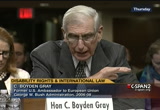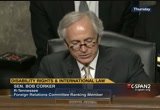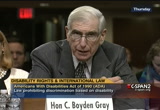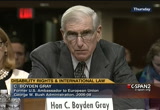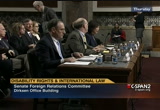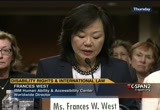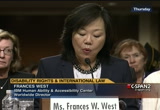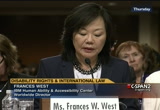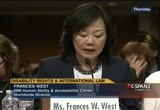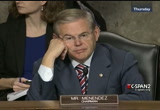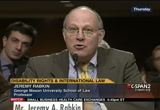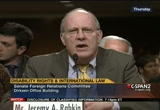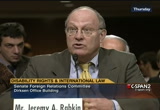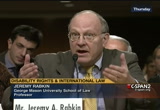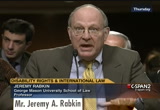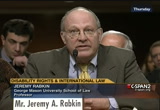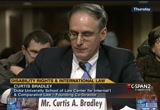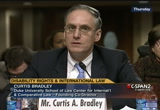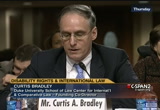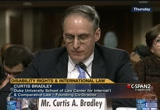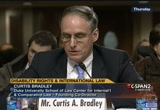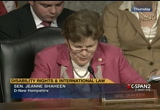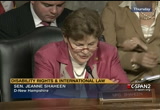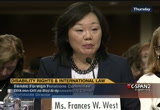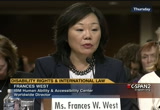tv Key Capitol Hill Hearings CSPAN November 22, 2013 2:00pm-4:01pm EST
2:00 pm
quite tied up in neat bundles yet. but at this point i think we've learned an awful lot, at least i have, and reminding you as we finish up to hand in the blue evaluation forms after you filled them out if you would. i want to thank our colleagues at the commonwealth funds for their help in planning and, obviously, making a big direct contribution to the success of this briefing. thank you for some of the best, hard and microphone questions that we've had in a long time. and ask you to join me in thanking the panel for a really enlightening session. [applause] ..
2:02 pm
[inaudible conversations] [inaudible conversations] >> if you missed any of our coverage of this live event you can see it on our web site at c-span.org. there has been a constant procession of people all day as members of the public and kennedy family members have come to pay respects that president john f. kennedy at the grave at arlington national cemetery just outside washington, today marking the 50th anniversary of the assassination. the eternal flame the centerpiece of the grave site, when it was originally requested --
2:03 pm
>> the eternal flame the centerpiece of the grave site was originally requested by first lady jacqueline kennedy. the permanent grave site was opened in march of 1967. several remembrances taking place today, one just wrapped up in dallas, the site of the assassination and another at the jfk library in boston. we will get under way live at 2:30 eastern. we will have those tonight starting at 8:00 eastern. we will watch from arlington national cemetery.
2:07 pm
[silence] [silence] >> again, the scene at arlington national cemetery, the grave site of president john f. kennedy. as we transition to a live picture of the u.s. capital. the house and senate both out for thanksgiving recess. president obama has ordered flags to be flown at half staff until sundown today as today marks the 50th anniversary of the assassination of president kennedy.
2:08 pm
>> this weekend booktv is live in florida for the miami book fair international. coverage kicks off saturday at 10:00 eastern on c-span2 with dave barry, brad meltsir, lawrence wright, doris kerns goodwin, nathaniel of philbrick and call ins with peter baker and susan herman. sunday's coverage starts at 10:30 and includes john higher oilman and chris matthews. miami book fair international live on booktv on c-span2 and don't forget to weigh in on our november book club question, what books are you reading on jfk. post your thoughts any time on our book club chat room, booktv.org/bookclub. >> ladybird johnson was the first wife of a president to become a millionaire by investing in and running radio
2:09 pm
and tv stations in texas. watch our program saturday at 7:00 eastern on c-span, live monday night our series continues. >> the historic trip to china, mrs. nixon was looking at a package of cigarettes. the cigarettes hata pin on them and the package, i understand you also admire the panda at the zoo. he says we will make sure you have pandas to go home with. wasn't expecting her to support her husband, just her being there was so much good will and always evidence that the end revenues reports would come, they would talk about it this way but always what wonderful job it makes them do. >> first lady pat nixon monday night at 9:00 eastern on c-span.
2:10 pm
>> secretary of state john kerry told lawmakers this week it is time for the u.s. to ratify the disabilities 3d. he appeared before the senate foreign relations committee. a former u.s. ambassador to e.u. and former white house counsel to president george h. w. bush also testified in support of the treaty. last year the treaty will five votes short of ratification by the senate. senator bob menendez of new jersey shares this meeting. [inaudible conversations] [inaudible conversations]
2:12 pm
[inaudible conversations] [inaudible conversations] >> good morning. this meeting of the convention on the rights of persons with disabilities will come to order. let me start by thanking secretary john kerry for being with us today for the second hearing on the ratification of the crpd and i think, mr. secretary, first, the thanks of all of us on the committee for the incredible work you have been doing on behalf of our
2:13 pm
country across the globe and your presence here today sends a strong message about the importance of this issue so we appreciate you taking the time to come back to the committee that you cared to support the treaty. we convene a second hearing on ratification of the treaty having received the enthusiastic support of literally thousands of people and organizations, all of whom with letters, petitions and various statements for the record looking for us to finally take the treaty over the finish line. we have received compelling letters of support from companies like coca-cola, direct tv, nascar and the consumer electronics association with over 2,000 member companies. the u.s. chamber of commerce, and the chamber is represented in the audience today as is the u.s. business leadership network which submitted a letter from 50 companies in support of the treaty including microsoft, ibm,
2:14 pm
at&t, merck, jpmorgan -- jpmorgan to mention a few. and i want to recognize former president and ceo of the round table, steve bartlett who is here. when he was in the house, he was a leader of the effort to pass the americans with disabilities act and we appreciate his presence and we receive individual letters from 84 non-profit disability of religious organizations like the red cross, easter seals, national federation for the blind and special olympics to name a few not to mention sign on letters representing over a thousand different groups. we heard from individuals, some not so well-known and some very well-known citizens like colin powell, chinese human rights activists, special olympics athlete loretta claiborne, king jordan, president emeritus of dallas university who wrote
2:15 pm
nothing is more american than recognizing equal opportunity for all citizens. at the end of the day dr. jordan's simple but compelling statement is the sum and substance of why we must ratify the treaty and we have several petitions organized by different groups with a total of 60,000 signatures. let us not forget what this treaty means to veterans. we have received letters of support from 15 veterans organizations including the american legion representing 2.4 million veterans and veterans of foreign wars with 1.5 million members and i would like to recognize and national commander of the american legion, dan dow lunger --dell g --dellinger who is with us today. we thank you not just for that but on behalf of a grateful nation to all of you who have
2:16 pm
served, thank you very much. we are deeply honored to have our wounded warriors of all generations including from iraq and afghanistan, veterans of america. thank you for taking the time to show your support. you certainly have arms which is one reason we should ratify this treaty as soon as possible. we salute you and thank you for your service and your sacrifice. and soon receive a letter of support from several former secretaries of defense. at the end the data support from the u.s. military veterans committee has been overwhelming. so i move that all the petitions, letters, written statements of support we have received reflect the extraordinary depth of support of the treaties that it has from thousands of americans on both sides of the island every walk of life. without objection so ordered. let me conclude by saying that the end of the day ratification of the convention and rights of people with disabilities is the
2:17 pm
right thing to do. i repeat dr. jordan's simple message, nothing is more american than recognizing equal opportunity for all of our citizens. let me turn to the distinguished ranking member of the committee, particularly want to thank him for working with me on a process forward to have a very substantive discussion about what the treaty means, what it can achieve, what are some of the concerns for the committee and beyond, and extraordinary effort to work with you. >> thank you, mr. chairman. i do appreciate the tone that you have set in your leadership and committee members have set and separating and insuring that those things we do beyond our shores are in the most bipartisan way possible and i appreciate the way the committee
2:18 pm
works together. i want to thank john kerry for being here today and as i mentioned to some of the leading advocates just a minute ago, i think the ratification of this treaty really rests solely on the administration's willingness to ensure that this treaty has no affect on domestic law, no affect. so far the administration officials have been pleasant but unsatisfying and as concerns are raised, the administration so far has not shown a willingness to try to accommodate those so i am glad the secretary is here. i am so proud of the people who are here and the efforts they have lead over the last several decades to advance so many
2:19 pm
significant measures that have had such a positive effect on the disability community. it has been outstanding. the hearing we had last year may have been one of the most moving hearings that i participated in as we had senator mccain upfront with many others talking about many strides that have taken place and i do think that was one of my high marks in the senate. at the same time, people have said that it is the implementing language, that there are no further steps that need to be taken domestically in. we just had a case, and there has been some dispute over its implications but it is the case that significantly points out how the supreme court or courts can in fact take into account treaties to affect domestic law. we saw where a woman in
2:20 pm
pennsylvania actually was being convicted because of the treaty we have relative to chemical weapons and i know some on the committee have stated that the reason for that was congress passed implementing language. interesting argument but even after this treaty passes another congress can pass implementing language and when that occurs it does expand. it does expand the limits of what we now have at the federal government level relative to federalism and the very issues. i say to the secretary as he begins to testify, i would love to see the advancement of rights for the disabled. i would love to see that happen. would love to see america continue to play a role in advancing those kinds of things but as i just mentioned, it is
2:21 pm
absolutely incumbent upon the administration to agree to very difficult language that absolutely issuers in every single case data treaty like this will not infringe upon federalism and other issues that are very important to people on both sides of the aisle so i hope this hearing will be more about substance, and unless about cheerleading and i hope the secretary's testimony will reflect that. i thank you for being here, appreciate the chairman having this hearing and look forward to a substantive hearing as he alluded to and appreciate the witnesses to have come here today. >> mr. chairman and ranking member corker and members of the committee, thanks very much for welcoming me here to talk about the disability treaty which i am anxious to do, mindful of the comments of the ranking member
2:22 pm
just now, i will start off by saying we are 100% prepared as we have been to work through the reservations, understandings and declarations in order to pass this treaty. that is our goal. as we begin with a place that makes it clear we don't believe this has impact but we are happy to restate and reassert the law in ways that make senators feel comfortable. we want to pass this. is not lost on any of us that only 11 months ago the senate fell just five votes short of approving this treaty. more than 60 senators resolved in their minds many of the questions that are raised again and again and we can go into them today as i am sure we will. obviously the day we fell short,
2:23 pm
a number of people who had previously been going to vote for it and changed so it was even closer, that was a rough day for those who support the treaty including senator john mccain, who is hardly a newcomer to this issue and is one of the strongest and most eloquent voices for why we ought to be doing this. for why, to put it bluntly, this treaty is in america's interests. in the after action conversations i had with many senators, republican and democrat alike, including a number that voted against the treaty, i even heard some will regret about what transpired and the intended message the outcome sent to americans with disabilities as well as other people around world and i heard from many not just a willingness
2:24 pm
but a hope that they would have the chance and the new congress to take up the treaty again and to demonstrate the important truth that senators from both sides of the aisle care deeply about the rights of people with disabilities. so thank you, chairman menendez for your comments and your leadership in bringing around a first hearing and being willing to come back at this important treaty and thank you, ranking member corker for joining him in a bipartisan way to do what you have talked about trying to do here. and that is with an eye to trying to make certain that we care all of the concerns so that every senator can make up their own judgment in an atmosphere that is not clouded with procedural questions as we unfortunately were last year.
2:25 pm
we all approach this renewed discussion, we and the administration having listened carefully to all of you and we recognize while many senators voted yes, some senators were dissatisfied with the process last year and several are not prepared to support the treaty until they feel certain concerns are addressed, so again i repeat i am absolutely committed. i said this to the chairman in private conversations, we will work with you on an appropriate reservation or understanding or declaration as appropriate in order to try to clarify something if indeed it really is begging for clarification and we are not able to show adequately through legal cases, through precedent, through the reality of the treaty itself that it is already addressed. i still believe what i believed the first time we tried to do
2:26 pm
this when i was a share, that the ratification of the disabilities treaty will advance core american values. it will expand opportunities for our citizens and businesses and it will strengthen american leadership and i am still convinced that we give up nothing, we get everything in return. we give up nothing, but we get everything in return. our ratification does not require a single change to american law and it isn't going to add a penny to our budget but it will provide the leverage that we need in order to push other countries to pass laws or improve their lawns or raise their standards for the protection of people with disabilities, up to the standard that we have already adopted in the united states of america, up
2:27 pm
to the standard that prompted president george h. w. bush and republican leader bob dole to pass the americans with disabilities act and indeed to negotiate the treaty. i am especially engaged as a secretary of state because having traveled to a great number of countries will ask nine months since you confirmed me, i haven't seen firsthand the need for this treaty in ways that i never have before. it is not an abstract concept. this is not just a nice thing to do. it is not something that is for the view. it raises standards for the many and there are countries where children with disabilities are warehoused from birth, denied even a birth certificate. not real person. and treated as second-class
2:28 pm
citizens every day of their life. united states has the ability to impact that by the passage of this treaty. 138 countries already signed up to this. in too many countries what we did hear at home with the american with disabilities act has not been realized overseas. in too many places what we take for granted here hasn't been granted at all. i will never forget my visit recently to a sports rehabilitation center for disabled veterans in bogota, a senator we support was funding from usaid and i met with police officers injured by grenades, soldiers and wounded i i edies, volunteers caught in the tragic shoot outs that take place over their efforts to help us together to and force global international narcotics
2:29 pm
objectives. these great men and women risk life and limb and lost friends in battle yet there is a whole world they are unable to access today because of their disabilities which they received as they undertook duties, shared by our hopes with regards to the enforcement of the law. moments like this clarify the export of our gold standard. the global gold standard, we should be extraordinarily proud of it, we are, but i would hate to see us squander our credibility on this issue around world because we are unwilling to embrace what we actually began, this initiative. when i tell other countries they ought to do what we have done i am often reminded that we haven't done what we said we're going to do. we haven't and joined the treaty
2:30 pm
ourselves. pretty hard to leverage people when you are on the outside. so those 138 parties to the treaty when they convene, we miss out on the opportunity to use our expertise to leverage what we have done in america and put it on the table. we are not at the table. .. >> i don't want to see us continue to take ourselves out of the game. no member of the senate should
2:31 pm
want us to voluntarily take ourselves out of this. remaining on the sidelines jeopardizes our role in shaping the future of disability rights in other countries. we need to help push the door open for countries to benefit, not just from our example, but from our guidance and our expertise, our experience. joined the treaty is the most powerful step that we can take to gain all of those upsides. don't take my word for it. anthology this committee last month, former secretary of state colin powell said it best. he wrote, if the senate does not approve this treaty, the united states will continue to be excluded from the most important global platform for the implementation of best practices in disability rights abroad. so this is about something very real. look at the numbers of people who are here today and the number of groups represented behind me here today. every one of them represents
2:32 pm
thousands more people for whom this is very real. it's about things that you can see and you can touch and that make a difference to people's lives. i'm talking about sidewalks without curb cuts, try managing that. public buildings with no accessible bathrooms. restaurants, stores, hotels and university without ramps or elevator access. this is without lives. train platforms without tactile strips that keep you from going over onto the tracks. we cannot afford to ignore these barriers as problems affecting other countries but don't affect us. they're present all over the world, including in some of the top destinations for americans traveling abroad for work or study. or for pleasure. and we're not using all of our power and influence to change things for the better if we
2:33 pm
don't join the treaty. i would ask you just to think of it was his treaty could mean, and it means something for everybody with disabilities. but i do particularly want to ask you to think about what it means to our veterans with disabilities. last year, i met dan berschinski. he's a west point graduate, retired u.s. army captain, and afghanistan war veteran. like many of us, dan never thought that he would one day have a disability. or be an advocate for people with disabilities. but his life changed instantly when he stepped on the trigger of an ied and lost both his legs. dance become absolutely clear, searing, stark terms about the difficulty, the fear, the embarrassment of negotiating obstacles abroad as a person with a disability. he experienced those obstacles firsthand when he traveled to south africa. as he told me last year, the
2:34 pm
advantages we take for granted here at home that allow people like me to live fulfilling, independent lives, don't exist in much of the rest of the world. let me tell you the good news. dan is now a student at stanford business school. and he wants to be able to take advantage of every possible opportunity. he can do that in the united states because of the ada and other disability rights laws. but as dan will tell you, his opportunities in the increasingly important international market are hindered by his disability, a disability he acquired fighting overseas on our behalf. he is asking us now to fight for him and a lot of folks like him on their behalf. there are an estimated 5.5 million disabled american veterans just like dan. many of the veterans and their
2:35 pm
beneficiaries on the post-9/11 gi bill have a disability, and many of them are unable to study abroad because of poor accessibility standards at schools overseas. i've met with recovering veterans at home in massachusetts. i've met within a walter reed. they want very simply a world where they can be independent, go out and fend for themselves, where they can travel abroad to work or study or vacation. they should never have to worry about whether the disabilities sustained fighting on our behalf are going to prevent them from accessing classrooms, a workplace, a hotel or transportation overseas. like all people with disabilities, they deserve a world where they can fully participate in the global economy on equal terms without fear of discrimination or loss of dignity. joining the disabilities treaty will also help expand opportunities for american students with disabilities, who need to be able to study abroad
2:36 pm
to prepare themselves to compete in the global economy. i want you to take the example of anais. she is one of the outstanding interns at the state department. she's here today. anais is a graduate student with dreams of a career in foreign affairs. she happens to also be deaf. two years ago, she traveled to ghana. it was the opportunity of a lifetime. but the obstacles she faced from the absence of written directions on how to proceed through customs at the airport to the absence of fire alarms with flashing lights in public buildings, made the demands of everyday life so much more difficult for her. she managed to travel despite obstacles in her way that would stop others from traveling at all. anais is exceptional.
2:37 pm
but it shouldn't be the exception, it should be the rule. america has more students with disabilities in higher education than ever before. partly by virtue of what we've accomplished with the ada. so students with disabilities participate in study abroad programs, unfortunately, less than half as often as those without disabilities. our joining the treaty will help change those numbers. i would just ask you very quickly and then i would wrap up, as consider just a few concrete examples. we're talking about joining a treaty that will strengthen our hand as we push for fire alarms with flashing lights so people who are deaf or hard of hearing know when there's an emergency and they need to evacuate. we're talking about joining a treaty that will give us the leverage we need to push for other countries to have sidewalks with curb cuts so people who use wheelchairs can safely cross the street, or tactile strips on train platforms so people who are
2:38 pm
blind don't fall into danger. our joining the treaty means that we lead the way for other countries to raise their standards, and it means we lead the way for them to adopt our standards. for all of these things, accessible bathrooms, tactile strips, firearms, flashing lights, all of the enhancements that have made an enormous difference in the lives of americans with disabilities. now, i will admit to you change is not just couldn't happen with the passage of the treaty. it's not going to happen overnight. when we passed the ada, sidewalks with curb cuts and bathrooms that were accessible didn't appear the next day, nor did all of the businesses that make accessible products that serve people with disabilities. the disabilities treaty, just like the ada, is a process. our joining the treaty, followed
2:39 pm
by a very important ingredient, we pass this tree, i will send a message to every embassy in the world. and we will begin to engage a protocol that will have our people reaching out to every country and every government. and we will use our presence in his treaty to leverage these changes in these other countries to encourage these changes, to use the voice that you will give us by actually joining the voiceover not able to exercise today for our absence as a member. if we join weekend ensure dan and others like them at the same opportunities abroad as other americans. that's why the american legion, our nation's largest wartime veterans service organization, which i'm proud to be a lifetime member of, the vfw likewise, many other veterans groups support the ratification of this. if we join, ask you to think about this. what is the american chamber of commerce supporting this?
2:40 pm
why are so many businesses? coca-cola which is i think in something like 198, 200 countries plus. why do they support it? because this will open new markets. it will level the playing field for our businesses who already meet accessibility standards. as other countries rise to meet our standards and need our expertise, guess what? they're going to look to american companies that already produce these goods. and we will be able to help them fill the needs, and this means jobs here at home. that's why ibm and consumer electronics association, and many of the businesses support ratification. so i think this is a single most important step that we could take today to expand opportunities abroad for the more than 50 million americans with disabilities. this treaty is not about changing america. this treaty is about america changing the world. and i hope that each of you will
2:41 pm
put yourselves in a situation if you were disabled, one of our colleagues, mark kirk as we all know who supports this treaty, has unfortunately found himself fighting back against things that happen unexpectedly. and so while our circumstances might change, an our rights andr opportunities should never change. and with the passage of this treaty we have an opportunity to guarantee that for all americans. and we also have an opportunity to change lives for the better for a lot of people in the world. that's what america's all about. i hope we will ratify this treaty. thank you, mr. chairman. >> thank you, mr. secretary, for a very substantive, very vivid examples of why the treaty is so important in the lives of americans with disabilities. and the lives of their families who a company them. of the lives of our veterans.
2:42 pm
let me start a round of questions and then try to get to some of the issues that i've heard, i'm sure you've heard them from your best effort in this regard and we have heard in the first round of hearings and individual conversations. some argue that the united states should not enter into treaties and cannot involve matters of national security. what would you say to those who espouse the view that treaties like this are unnecessary? >> well, mr. chairman, i think i've just given you, you know, a fairly strong description of why this is necessary. i me, we join treaties because there in our national interest. and we do it, i mean if you think about the treaties that the senate has passed on occasion that positively impact the lives of people, we pass treaties that promote religious freedom. we've passed the treaties that allow for intercountry adoption. we've passed treaties for the
2:43 pm
international recovery of child support. we've passed treaties that enforce intellectual property rights. i mean, we do this because it's in interests of the united states. and as i've said in this particular case, it is in the profound interest of everybody with disabilities. and i find it very hard to see why we could ask people to go abroad, fight, sustained an injury, fight for our values and not reinforce those values identify them to travel abroad, work abroad, the study abroad with the same rights they have here in america. that's what's at stake. that's what makes this inner interest. >> now, another argument i've heard is that ratification would subordinate united states to the u.n. and allow our laws and actions to be guided by the united nations with the disabilities treaty committee foreign courts and judges, i
2:44 pm
personally disagreed with that here and i think we have tried to explore it in her first hearing. but i'd like to get your take with that, with the ratification violate principles? >> no. on the contrary. there's no impact whatsoever on the sovereignty of the united states. in fact, you all are exercising our sovereignty right now by doing what the framers of the constitution envisioned, which is ratifying a treaty. and the treaty, if it doesn't have any negative consequence on the united states, it doesn't require us to do anything. there's no subjugation for any entity outside, no cause of action created year. access to american courts, no enforceability. there's no self execution in here. so there is no cause of action as a consequence that allows people to go to court. so, in fact, joining this treaty doesn't require change to u.s. law, and there is no reach whatsoever by any committee or
2:45 pm
any entity outside that one committee that exists within the framework of this treaty is allowed to suggest this, but they have no power to enforce, no power to compel, no power to do anything except put an idea on the table. nothing can change unless the united states senate were to re- ratify whatever suggesting the united states senate might engage in subsequently. but there's no change. finally, i appreciate the comment that you made here today in public as well as the ones you've expressed to me and i believe other colleagues in private about our openness and willingness to consider reservations understands and declarations that would amplify, possibly clarify, us wage insurance that members have in terms of voting for registration -- ratification of the treaty.
2:46 pm
i just want to create a framework for that. i think myself as the chair and working with you and others is very open to the process. however, we could also requests of us that go beyond an appropriate balance. and so, while we want to work very deeply with those who want to get to a yes on the treaty, and find a way for them to do so, it is my hope that the request that we get reservations understands and declarations are fair and balanced so that we can take care of the concerns that exist. and at the same time not undermine the very essence of our standing with the treaty. is that a fair statement of how we seek to balance this?
2:47 pm
>> a very fair statement, mr. chairman. that's exactly our view. look, i mean, last year when we did this process we entertained, and i was happy to entertain this chair, a number of reservation. a number of understandings, et cetera. i thought we did a good job but we could maybe hold them and do more are willing to work with you, but we don't need to fill this thing up with, you know, stack of we statements of things that absolutely don't need to be restated. i think we have to exercise a little bit of restraint and judgment as to what's really a case and controversy here, and what is not. i am absolutely prepared, and i said this originally to you, to both you and to the ranking member, you know, we want senators to feel comfortable. so we are prepared to address legitimate concerns and we will work with you to do it. >> senator corker.
2:48 pm
>> thank you, mr. chairman. and i think you know, mr. secretary, i typically do not read from notes, but i'm going to do that today just to ask the questions in a specific way. i do want to say to all of the people here advocating on behalf of the treaty, i don't think there's anybody out here that disagrees whatsoever with advancing, advancing this cause. and i know that's why so many letters have come in in support of this. i may, i don't think that's in question. when people look at these kinds of issues, sometimes they forget that there's a whole body of law out there that affects people domesticadomestica lly in ways that were never intended. and so my goal here, think a number of people on the committees goal come and others come is to make sure that the best of what this treaty is about is to serve, but at the
2:49 pm
same time you end up in a situation where inadvertently you haven't done things that affect us domestically in ways that we never intended for that to occur. so let me just ask you a series of questions. in the supreme court case, department of justice argued both that ratification of the treaty can expand existing federal power to legislate be on its traditional limits, and that the framers intended for the senate to enforce federalism limits on treaties through its advice and consent power. do you agree with the argument that your administration has put forth? >> i don't believe that bond applies here. so it's not a question with i agree or disagree with the argument they put forward. the question is, does bond having impact on the passage of the disability treaty and the fact that it's a case of controversy at the moment before the supreme court. the answer is bond involves a
2:50 pm
challenge to in implementing statute that was passed after the senate gave its advice and consent to a treaty. in other words, after the chemical weapons treaty was passed. then implement the language of past. in this case the implement the language has not only been passed, it has been found constitutional by the supreme court and has been put in practice for years. we are talking about the ada. that's the implement the language. so in contrast year, no new legislation is required. even former senator demands recognize that and accepted that fact. so the constitutionality of our domestic legislation, which was passed and entirely independently of the disk industry has repeatedly been sustained by the courts. so we don't have the potential of a bond crisis here.
2:51 pm
and i think it's being inappropriate applied to this treaty. >> okay. so, can you confirm then that no for the legislation, i think you just it, i want all this for the record if i could, can you confirm that no for the legislation is necessary to meet our obligations under the crp be and that there will not -- there will not be a be in need in the future for any for the legislation to satisfy the conventions requirements? >> i can confirm that no legislation is required to implement this, you know, whether congress 20 years or not thinks it has to tweak something, i can't speak for that but obviously -- >> but -- >> nothing is required to be passed to satisfy this treaty. >> very good. so the united states is clerk not accepting any obligations under the treaty to regulate beyond the federalism limits reflected in the ada and other federal laws? >> that's accurate. >> and it would certainly be no need for additional authority beyond the current limits of federal power for the federal
2:52 pm
government-to-government crp become is that correct speak with that's correct sticks it we established it comes with no additional federal obligations and requires no additional authority, few support strong federalism to -- both of those possibilities, yes or no? >> i would support an appropriate, yes, with respect -- >> that addresses these issues come one that affirmatively and declaratively addresses these issues? >> that clarifies the federalism reservation and how it would work. i think that's appropriate. >> i'd like to obviously, we have attempted to work with your step -- >> in other words, it restates of the fact that the treaty would only obligate us to take action that we can take under federal law. that's the reservation and you know, we have a right to have a rud appropriate state and that. >> i think it's very important
2:53 pm
that this is a very clear statement and look forward to working with you. >> absolutely. >> enters have been raised whether a rud we adopted they could be invalidated or ineffective by future congress, by a court, by the human disabilities committee. i think any sender would want to make sure we can be competent that our rud will stand the test of time and would take the view that their advice and consent was conditioned on the path rud adopted by the senate, do you agree with that? >> i do spent which you support a rud the ties are treaty obligation to the continuing liturgy of the rud? >> very important to very important answer. >> say that again. what i support a -- >> will you support a non-severability rud that ties our treaty obligations to the continuing validity of the rud's? >> i do if i can.
2:54 pm
i would just have to be able to make sure that we have the power to do that and it can be done but there is no way the rud can be dropped, if they become part of treaty, they embraced in the treaty and get have to pull out of the treaty or the treaty would have to be changed altogether for the rud not to be enforceable. but can we look at the language so that i'm not committing to something that -- >> i would just come off as a what you look at the language and speed we will work with you on the language. i just want to make certain. >> if for some reason your staff decides that this is not something that can be done or is not a series concern, will you provide, will the department of justice provide, in writing, confirmation of its legal review that the senate rud cannot be invalidated, or otherwise rendered ineffective for either domestic or international, legal purposes? >> here's what i commit to you. first of all, my staff is not going to decide on its own.
2:55 pm
i'm going to decide. that i'll take a look at and see where it are a few and i will talk and we'll see what our options are. secondly, i will certainly engage with the justice department are defined at what's possible. but i think not to be able to find a way of the language to appropriate reflect what you tried to do spent i think you know that -- >> we want to act in good faith to try to answer the question. so the ruds that you enter into, you in a summit feeling like you are entering into a quicksand deal. spink i agree. if i could ask one more question. thank you for the time. in addition, the treaty of out for the withdrawal of ruds. and, in fact, state parties are often encouraged by monitoring committees and others to withdraw their rud in order to comment on what they consider to be full compliance with the treaty. could a future congress or executive withdraw rud either through the normal legislative process or unilateral executive
2:56 pm
actions, thereby circumventing -- remember, the treaty is ratified by two-thirds -- thereby circumventing a constitutional protection provided by two-thirds majority requirement of the senate advice and consent. you understand what i'm asking? >> i'm told that this has never happened, that we wouldn't do it without, you know, a fair amount of processed engaged in it. no foreign country can invalidate the u.s. rud, i'll tell you that. and no disability committee or anybody could invalidate the u.s. rud. so we would be the only ones who could do. i'm not sure exactly what -- i prison you would have, you know, it would take -- i think it would take an entirely new resolution. i've have to find out for you, senator spent more specifically then, could be federalism rud be withdrawn in this manner, thereby eliminating the limits
2:57 pm
the senate has put in place and pass legislation that uses expanded federal authority under the treaty to intruder on the powers of the state? >> probably know. because that would be in contravention of the federalism. >> so i take that to mean that you would support a rud to protect our ruds from withdraw without a new resolution of advice and consent from the senate? >> on the surface that would appear to be a good thing to do. i would want to check with my counsel and everybody run it through, why not? >> i think you and i think the chairman for his patients. and i would just say to the committee of people here that are advocating for the passage of this treaty, all the things that i just asked about today have nothing to do with helping other countries around the world deal with these issues that are so important, especially the people advocating today. they are about ensuring this --
2:58 pm
that this treaty doesn't have the unintended consequences that sometimes can occur here in the country. and i would just ask all those who are advocates year to help push the administration and others to resolve these issues with us if, in fact, you believe this treaty is something important to pass. and i thank you for the time. >> thank you, senator corker. now, i've extended the time for the ranking member because he played a very important role. i'm going to have to, because there's going to be action on the floor, abyei our timeframe here, ask members to stick to their time. i'm going to hear to strickler. so with that, senator cardin. >> thank you, mr. chairman. secretary kerry, thank you for your extraordinary leadership and thank you for what you've done as secretary of state. you have been an incredible voice for america and we thank you for that service. i want to acknowledge the presence of doctor morgan, a
2:59 pm
commission of the maryland commission on people with disabilities. doctor morgan is a retired neurologist of 20 years of experience in the field of neurology, psychiatry and diagnostics radiology. he's a tireless advocate working as a volunteer for the national ms society. is a person who lives with ms. i just would like to quote one of the statements dr. morgan made, and that is that a person with a family living abroad, i would be able to visit my siblings, nephews and extended families without the uncertainty accessible that has plagued prior visits. just underscoring what you have said, secretary, about how important this treaty is for americans who are traveling abroad. and mr. chairman, i would ask consent that the statement by secretary hagel in support of the legislation on behalf of the military families and the 5.5 million american veterans that have disabilities been a part of the record. >> without objection, so ordered. >> mr. secretary, i often write
3:00 pm
3:01 pm
the generic rights absolutely comes up and you wind up with people pushing back on one thing or another about our absence from the table either not having signed up to a particular treaty i would tell you this has happened frequently for instant, though that's not the issue in front of us. but with respect to human rights and other things, we often get -- with me just say up front i never go anywhere, any meeting i have anywhere we discussed the question of rights, human rights, the question of what's happening in the country, its transformation reforms. we always run into some kind of a debate about the differences for the differences here. but on this kind of thing, i have raised this issue on occasion in certain places and people indicate a readiness and a willingness to try to do
3:02 pm
things but they are not particularly averse to. they don't do what the options are and they are not sure how much it costs or how long it takes or what the complications are and that is our virtue of being able to put the ada on the table and be a member so we go to the 138 member countries and starts to engage them and the answer is the old clean hands doctrine of the law. if you come in and you are not a part of it of course you lose leverage. >> that ratification the treaty strengthens the position internationally in advocating on behalf of human rights for people with disabilities. and it's interesting when you look at the basic human rights and the advancement of the basic human rights. when the united states is a much more challenging to get the type of progress that we need.
3:03 pm
when you run through the list and look at the countries that signed up to it you see incredible opportunities here. saudi arabia, south korea, yemen, tanzania, united kingdom actually, jordan, you run around these countries israel actually did a resignation with respect to one thing, but that they are comfortable. so i think our legitimacy as the full advocate that we have the full power to be because we are the ones that initiated this, we are the ones that negotiated and went to the countries and is said to come onboard and no on e are not there the result is that the committee isn't as energized as it could be so there's a lot
3:04 pm
that could be done by our joining up. >> i will make an observation that the united states has been a leader in advancing the rights of people with disabilities. in 1991 in the moscow doctrine it was the u.s. leadership of congressman hoyer very much involved in taking the work that we did here and bringing it to the regional organization. and it's frequently cited now as a document that is used to make sure the proper accommodations have been made. the ratification of the treaty as you point out, countries that are so, so far behind us in accommodating people with disabilities have already signed and ratified this treaty. so it gives us a seat at the table to advance their law for disabilities as a golden opportunity for us it's interesting that these countries
3:05 pm
have already ratified and approved and we are still in the process of dealing with it. >> thank you. >> thank you. >> we have been notified that there might be some significant measures taken on the floor here at 10:30. thank you for being here. as the grandson of -- my father was disabled by polio as a young child he struggled his whole life to provide for his daughters and family so i'm extremely sympathetic to the goals. i'm getting a lot of e-mails and letters by what they are hearing and reading about this so i have two quick questions. the first impulsive statement that we made in 2,007 when the general assembly approved the final text and the u.s. issued a final statement that clarifies or understanding the phrase reproductive health and article 25 does not, and i'm quoting, does not include abortion and that it's used in that article doesn't create rights and cannot be interpreted to constitute support, endorsement or promotion. >> what the administration support the inclusion of the
3:06 pm
understanding that reaffirms this policy? >> as you know, senator, last year, we had a debate about this in the committee and i thought we came up with a pretty good run. and it didn't include any language regarding any medical procedure. i think we used the word any medical procedure that it didn't refer to that whatsoever because there was some back-and-forth on the issue. a final issue obviously about pro-choice and pro-life. i thought that we threaded that needle fairly dejected lee. if there's a conviction by the committee that doesn't or hasn't, then we ought to sit down and work through the language, but we want to make it absolutely clear that nothing in the article 25 or anywhere else in the treaty creates the right to abortion. that is a domestic legal issue
3:07 pm
and nothing in this treaty changes that and that was in the transmittal letter to the congress that made it very clear that that is true and i thought the language we had last year helped verify it as we worked to make sure. >> we've got a lot of letters and e-mails about homeschooling. the returned testimony talks about an idea. parents homeschool their children. >> let me make it clear. first of all we value the right of parents to make decisions for their children including the decision to homeschool. nobody is seeking to believe there's anything in here that weakens or eliminates those rights the ratification of the treaty will have absolutely no impact on parental rights.
3:08 pm
during the markup last year that concluded in understanding proposed by senator demint to relay the concerns of homeschoolers i continue to support such an understanding as that will help better at senate concerns and i'm happy to try to work with you again to make sure that a language is adequate to do that. >> off the topic for a second i want to give you an opportunity because it has been in the news this morning. it appears that ayatollah khomeini era military forces referred to him as a rabid dog and if use accused them as frier in world war ii and an american official called that language -- what you just comment on that statement? >> obviously i would disagree with it profoundly. you are asking the obvious.
3:09 pm
it's inflammatory and unnecessary and in this moment when we are trying to negotiate and figure out what can and can't be achieved, the last thing we need is names back and forth. i don't want to exacerbate it but our good friends in israel know full well that we defend their concerns, deeply they are threatened access to c-charlie but what is happening in that part of the world and particularly we stand by our friends in israel completely, and obviously we don't believe that anything is served with, you know, names that challenge everybody's sense of propriety and justice. we've been through this before. we heard as you know prior very disturbing assertions regarding the holocaust and so forth and i
3:10 pm
think we need to move away from that and in the next months and years that will enable us to do that. >> senator? >> thank you chairman menendez to consider the rights of persons with disabilities. and thank you, secretary kerry for your ongoing leadership in her previous role as the chair of the committee and now as the secretary of state. protecting rights has gone up as the support of all americans. ratification would serve to solidify a strong u.s. commitment to equal opportunity for disabled persons through increased access, mobility, protection for disabled americans abroad and particularly wounded veterans. last year i think we missed a great opportunity and it's my hope shared by many of my constituents that we don't make the same mistake again. and at the risk of asking you to repeat things that have been asked and answered, mr. secretary, but this hearing strikes me as revisiting important fundamental issues that need to be asked and answered to reassure those of my constituents who haven't quite
3:11 pm
heard yes yet. in your view, what's the response to the critics of charge dot c. rdp that would violate u.s. sovereignty and that somehow the disabilities committee would be empowered under the treaty to dictate how the united states treats people with disabilities here at home. >> with respect to sovereignty as i said earlier, there is absolutely no ability whatsoever for any country or any entity through this treaty to gain any legal redress or capacity to compel the united states to do anything. there is no oversight. there is a committee that works on issues, but the most they can do is make a suggestion. there are 18 members elected on a global basis. they issue a report, but they cannot compel us to do anything.
3:12 pm
so there is zero to give up or loss of any sovereignty to the united states. in fact as i said earlier we are exercising our sovereignty by deciding whether or not we want the rest of the world to be imported by us so that over the next number of years as a member of the party to rise to our standards rather than stay static or rise lower or come to a certain standard. so i think that the united states gained by this and on the disabilities committee, the disabilities committee has absolutely zero power to change the law, to order a change of law and compel it change of law. they cannot have any impact. there is no power in this treaty by also in the committee that kennedy has no ability to create any customary international law, no decision or anything they offer can have an impact on the
3:13 pm
united states and what we reserve to ourselves or constitution and even through our declarations and understandings and reservations in this treaty. >> given that mr. secretary as i believe you have asserted the treaty doesn't compel us to do anything except continue to follow our own in our own way. if you would remind us what harm is being done for our ability to advocate for disability rights by being the empty seat at the table or merely an observer status of the committee for the commission of the rights of persons with disabilities. how does this harm our ability to advocate for americans, eric and with disabilities and standards for how we should treat citizens with disabilities around the world. >> there are a whole series of things that the treaty requires others to do. we've already done them. that's why you doesn't have an
3:14 pm
impact on us. we are already meeting those but it does compelling other countries to provide accessibility, to provide nondiscrimination and things they do like a birth certificate for kids. you can't deny somebody a birth certificate because they are disabled. it creates a set of rights about standards for education transportation, all the things that matter to us. it takes each of those components and it gives a legal obligation and other countries to live up to those standards. >> thank you for your hard work. i think this convention is a good opportunity for us to demonstrate a high standards but the united states has made the gold standard for treatment of the citizens with disabilities. thank you for convening this hearing. >> thank you mr. chair. before i had commented wanted an
3:15 pm
introduction. the general is with us today and i want to bring her to the attention of the committee. she was the first one of the non- position commander of the u.s. army medical command and acting surgeon general of the army with a nearly 8 billion-dollar annual budget in 2007 and she has extensive experience in the military that she wabutshe was challenged by e senator when he made comments about caring for blinded troopers and led an effort that resulted in the establishment of the dva center for excellence for vision following her experience in that regard any government harbored or she established the sole source information solution provided for anybody concerned about vision loss and we are very happy that the general is with us today and for all the work she does to advocate for folks around the world suffering from vision loss. thank you general and secretary. today's a big day. there is a lot going on in the world today and that you have chosen to be here with us is a
3:16 pm
tribute to you to hell important you view this priority. i was reminded of the great senator william who believed so deeply in the united states needed to ratify the genocide treaty that every day the senate was in session for 19 years he took the floor o to the floor oe and advocated the un genocide treaty that had been ratified by the un and activated it wasn't ratified until 1986. he gave over 3200 floor speeches over the course of 19 years until the u.s. ratified the genocide treaty. i hope we do it quicker than 48 years. this treaty was notified rather fight in those six but thank you for sticking with us. we have one question for you. the last time you were before us we were debating a difficult issue that remains difficult and
3:17 pm
that was serious and whether to authorize the use of military force. the committee voted to do that authorization. shortly thereafter, in your discussion, diplomatic discussion with serious and others steer you agreed to do something it hadn't done which it agreed. what moral leverage what the united states have had to insist that syria become a member &-and-sign onto those treaty agreements under the chemical weapons convention of the united states has not been a signatory for that convention? >> thank you for your reflections. >> i remember listening to many of those. your question answers if self. we never could have achieved it and we would have had no standing whatsoever to be able to try to argue it.
3:18 pm
>> senator markey. >> thank you, mr. chairman very much. can we talk about something in addition to the obvious benefits that will flow to people with disabilities, and that is that which will flow to american businesses if we have been international standards that is about 56 million people in the united states with disabilities, but there are about a billion people in the world with disabilities. so, for example, if we just take something like a u.s. law standard that says all of these devices have to be now accessible to the deaf and the blind and you multiply that by the thousands of companies in the united states but now have a part of this communications revolution, what could it mean for the american business if the
3:19 pm
standards are adopted in the countries all across the world. what could it mean in terms of practical benefits for the u.s. economy? if we join the rest of the world ratifying the journey that we are going on in terms of what that additional benefit would be for the country. >> you mentioned in my opening comment about the benefit of the business and why the american electronics association and others are supportive of this. a billion people, a billion people is a big market. the market but it drove the wealth creation of the '90s where every quintile of american income earners saw the income go up and the greatest wealth of the history of the nation was created, that market was a 1 billion-dollar market. and actually grew quickly that
3:20 pm
it began smaller and the result is this market is waiting for us to tap into. we have assisted -- we have electronic assisted devices that help people speak. they can print. there are extraordinary gains through technology and we will be able to sell it. different types of wheelchair accessibility. all kinds of benefits and communications and transportation. so, there are huge benefits for the company and the main line is jobs. >> not a small number of jobs, tens of thousands, hundreds of thousands of jobs in the united states directly related to be established across the rest of the world and i agree with you that it doesn't require any change in u.s. law. it's really going to be a benefit for the disabled around
3:21 pm
the world for the businesses here in the united states to be able to service that new market that has been created and we can be the leader in distributing those technologies as well as profiting here in the united states. thank you again. >> thank you, senator. >> great work. >> mr. secretary, i know that there are a series of members who would have liked to engage with you and i think the challenge is that there are procedures that are a tad to the scope about to pick place on the floor that will probably take about an hour of time. so, i understand and i assume that your schedule would not permit you to have that period of time. >> i regret mr. chairman -- >> i didn't think so considering what is happening in the world in your pressing schedule.
3:22 pm
so we will keep the record open extensively so that questions can be submitted and maybe working with you if there are any specific members that in another setting have some specific questions so maybe in the future we can work towards -- >> why don't i agree to this i really want this to pass and try to expedite it and be as helpful as we can at the department. a meeting at the state department for those senators that did have some of those questions we would be happy to meet. and obviously we are prepared to answer questions for the record in short order. >> between the record for those that want to have something on the record and for those that want to have a conversation about some of their concerns and how the department and the administration would react to it as a fair offer and i appreciate it. i appreciate your testimony here
3:23 pm
today. i think that it has been substantive and very compelling. i just wanted to share two final concerns. i know that we can try to create an environment in which we want to be as airtight as possible and i get that. however, looking at the future congress five years, ten years, 20 years from now on anything that the united states congress does and passes could be changed. of course it would seem to me that a united states congress would have to change it so there would be full debate and the upper trinity to do that as it relates so i wouldn't expect this would be the first time ever in history ... take place but i think there has to be a balance as to what it
3:24 pm
expectations are so that it's just an observation for the record. second, as you and the department work with any of the members as it relates i would urge you to also share with us because at the end of the day i have to be willing to support a set of the committee and that is the way that we will work together. with the thanks of the committee -- >> i want to thank you for your leadership on this. there is a lot going on here, but as you know, this is a prayer at the end i appreciate you making it so i want to thank senator barrasso who was an early supporter of this and stuck with it and very appreciative for the bipartisan effort. >> we have a series of colleagues who have joined us in this effort you mentioned senator mccain and senator
3:25 pm
barrasso, senator kirk as well as members of the democratic side. so, the goal is to get the type of strong bipartisan support that will pass the treaty trader there are a few times i think in our lives in public service that you can affect the lives of millions of your fellow americans in a powerful way that can make a quality of opportunity and access to that opportunity a reality. for the 58 million to face disability 5.5 million veterans that served their country they some sort of disability. this is an opportunity to do that. with the appreciation of the committee the secretary is excused. i'm going to apologize to the next panel. i hope that you can hang in there with us.
3:26 pm
i'm not in control of the time will be on the floor. it may be shorter but it's likely to take about an hour to the audience members as well. we will reconvene up on that final vote that takes place on the senate floor. but i believe it will be sometime within an hour. and until that time, the committee stands in recess. >> the senate foreign relations committee will come to order. first, let me say to the distinguished panel that we regret that issues on the floor have created challenges to us
3:27 pm
conducting the hearing. as a matter of fact we are not finished on the floor. but in order to listen to your incredibly important testimony, when i just do ranking member with his concurrence is to proceed during the vote and hopefully rotate and ask members to take the chair when it's necessary in order to get the testimony in the record and hopefully have an opportunity for q-and-a at the end. i know that mr. gray has to leave and we wanted us get the testimony and we appreciate your willingness to do so. so after we start with you we will excuse you and of course director will be open and we urge you to answer any questions. the second panel we have the director for human ability and the center for ibm. responsible for promoting advanced research technology in the department of the efforts to enable everyone to achieve their full potential to innovation and
3:28 pm
ambassador, former white house counsel to president george h. w. bush and a member of the board of directors of the atlantic council, the european institute and various other organizations serve as a special envoy for european affairs and u.s. ambassador to the european union and i understand his daughter, staff writer for "time" magazine was married saturday so congress relations to a proud father of the bride. jeremy is a professor of law at george mason university. the professor serves on the part of academic advisors and the american enterprise institute and is a board of directors of the center for individual rights and we welcome you. curtis bradley is a professor of law, public policy center of senior associate dean at duke university and the professor early in his career clerked for the supreme court justice and constitutional law and u.s. foreign relations so you ar wert the right committee. welcome to you all. with that, let me ask you to go
3:29 pm
first. all of your statements will be fully entered into the record. we would ask you to simplify and about five minutes. so hopefully we will be able to go forward and ask some questions. >> thank you very much. for the opportunity to appear and also for your accommodation for my schedule. i wish i could stay here for the entire conversation. it's very important and also very interesting. but i hope i can answer questions in the record if it is appropriate. i was involved with the architecture and structure of the americans with disabilities act almost from the very beginning starting with work but the then vice president bush did with the task force on the
3:30 pm
delivery relief under president ronald reagan who was supportive always of the stability rights and they grew out of the work that had been done during the reagan administration. the statute has been very durable, it has been a great success, it has really changed for the better of their lives of a great many americans, and as i enter as a leader. as many people have said there is no basic difference between the rights of the disabled and the rights of the aging and this has been a great success in the united states. we are in inadvertence installation -- situation implement in statute here not quite the reverse but close to
3:31 pm
it where we had in implementing statute 25 years ago in the treaty that has come out of that. there is nothing binding on this country and that is i think the most important point that i can make. the case. senator kerry does with that country can safely. the case was brought under the implementing legislation, not under the treaty itself. there will be no implementing legislation. here of course as senator kerry observed, there is no way to find some future congress from amending the adea but that's for the future and that is not at issue here. the purposes of the serve ability and if you take two
3:32 pm
examples that were raised earlier with senator kerry do they need to be stronger regulations a couple of them have been suggested and testimony will be given. i see no difficulty with making these strengthened reservations. but i also don't think that they are absolutely essential. why i ask because as the professor acknowledges and what is misunderstood in the convention of the congress already adopted a reservation and that were declaration that has the convention of being non- self-executing which he acknowledges will have the effect of preventing the direction from jude being enforceable on its own terms.
3:33 pm
they justify legislation that wouldn't be ordinarily mystified under our constitution which can't be justified and can't be used to justify interference with our system of federalism beyond what would ordinarily be possible. i don't think that it's a sensual but i think that if it's already been done by this very strong reservation of the non- execution no difficulty adopting the stronger statements. on home schooling which has been an issue in the past, it's been dissipated thankfully i want to express my own support for school choice i think i'm well known for this, homeschooling has blossomed under the regime
3:34 pm
and other disabled education in the treaty which is not enforceable and can do anything to hurt the movement or the vibrant movement of homeschooling here in america. with that i will be quiet. >> i prescient your testimony. i want to focus on one part of your testimony if you are still the white house counsel as you were under president bush, there are some who have suggested that we have to wait for the supreme court to decide on the decision before the senate would make a decision on the treaty.
3:35 pm
do you think that there is any reason that the bond case should delay the senate consideration? >> i do not. on the maritime wasn't at the argument, but i'm told that the justice was more skeptical than perhaps anybody else. so, it's pretty clear what the results are going to be that the results are your religion for the reasons that senator kerry stated in for the reasons that i just mentioned that there is a clear congressional he approved road that makes this treaty non- self-executing and reviewable in the court. so i see no way how the bond case can be relevant again to point out that the prosecution under an implementing statute there will be no implementing statute here. what's relevant for the purpose
3:36 pm
of the court is the adea itself and not this treaty. >> i understand you have to leave so i'm going to ask you some questions. i would -- first of all i respect you very much and i appreciate you being here today and i want to ask a couple of specific questions. i will say that relative to your last statement, but congress can also pass implementing legislation two years from now, four years from now. so the fact is that it's not necessarily even that that could happen but the fact that when you ratify the treaty, that itself can extend some and create some issues for us here domestically. but me ask you a couple of questions. as an advocate for the ratification of the treaty can do you agree that there are significant questions about whether the treaty can expand congress power into areas
3:37 pm
historically reserved to the states under the supreme court current case law? you agree with that, right? >> in the proposition, that is i think probably true. it's probably right. the case will clarify that, but we don't have that issue presented here because of what i have already mentioned which is the road that you've already adopted which means that the convention is not a judicially enforceable on its own terms. so, the only thing that the congress can constitutionally, what it can do constitutionally in the absence of a treaty. and you have already once an entity ada and you may choose to do so again, but it will be bound and restrained by the limits of the constitution and not in a bold in any way by the treaty because that cannot be judicially enforced. >> he would have no issue as you just stated since what i just made was a statement of fact.
3:38 pm
i'm talking about just to the treaties in general. he would have no opposition to a striking to clarify those very specifically with a set that has no impact on us being able to advocate and other countries that would keep this treaty from affecting us here domestically. >> i do not. i have no objection to clarify those issues and federalism issues. >> i hope that you can do that through the advocacy. is it important for the senate to adopt a strong package that protects the appropriate amount of power between state and federal government. >> the answer is yes. >> yes. >> you have made some statements in the record on the past and since the record of the hearings can have a bearing on the future issues that arise, i just wanted
3:39 pm
to re- ask those and again i respect your advocacy and respect your service to the country and i think you very much for coming. >> senator corker. >> i know that you are going to have to leave so we appreciate your willingness to ask customs from the record as we move ahead. >> i really do appreciate your understanding about my having to leave and i am sorry to my fellow panelists with whom i would love to have a robust session assuming that there were time. but it's not -- i just can't face -- thank you very much mr. chairman. >> thank you. ms. west. >> mr. chairman, mr. menendez, ranking member corker and members of the committee. my name is francis west. on the worldwide director for the ibm human ability and sensibility center. in this role, i'm responsible for evaluating ibm leadership are driving inclusive people with focused technology
3:40 pm
solutions. i currently serve on the board of directors for the institute on disability and the u.s. business leadership network. i am honored to provide ibm white house view and would like to ask for your support to ratify. global understanding and demand for sensibility continues to grow. driven in part by an entirely new set of disruptive trends including the growing aging population, mobile and smaller devices, social networking and emerging technologies such as smart tvs and devices. these innovations are creating unprecedented technologies that enhance the user experiences and create more fulfilling interaction for any individual anytime and anywhere. as a result, accessibility has become a mainstream requirement for the society. ratifications will help advance the marketplace for accessible
3:41 pm
information and communication technologies, benefiting the u.s. economy, businesses and individual citizens. we need these that i unify and to ratify countries, they can ask of a rate to two critical business imperatives that are foundational to market and job creation. first, the option of the national technology standards and number two, the execution of meaningful policies procurement regulations and technology research agendas. first standards, it plays a critical role in ensuring the interoperability of technology and the acceleration of innovation upon a common foundation. without harmonizing the international standards and an employee with a disability with the 96 country they operate in. using teleconferencing facilities or other tanning multimedia digital content
3:42 pm
through their computers or cell phones anytime and anyplace. >> you can see the reasons how it can help. first it embraces standards for the inclusion outlined in the ada and by extension, the u.s. accessibility standards. so for the u.s. company it is familiar to implement. second, the harmonized standards protect the investment and accessible technology and help us achieve that economy of scale on ensuring the positive return on investment. it helps to continue to lead innovation worldwide as the c. rpd countries are investing in the accessibility technology leadership and the ability to implement them is vanishing. now onto the policy benefits, it is the exaggeration to say that in many cases, policies bookmark
3:43 pm
it. the u.s. section 508 of the rehabilitation act is a great example. prior to the enactment of the federal procurement policy committee accessibility marketplace is small, disoriented and not an investment priority. however, section 508 in the binding power of the u.s. government have transformed the marketplace and played a major role in defining it as a mainstream government and business requirements. >> u.s. ratification of the crdp would have a similar effect. in addition, by prerequisite of equal education and technology access or people with his studies, the crdp would create a larger talent pool of knowledgeable workers with disabilities. enabling the companies like ibm to hire the best talent and meeting the requirements associated with the emerging policies, such as section 503 of the act. it is for these policies and harmonized standards reasons
3:44 pm
that ibm relieves that the u.s. can solidify technology leadership and the burgeoning marketplace through the crdp participation. failure to act would produce quite the opposite effect over the long-term stifling the addition of people with disabilities, opportunities and the prizes they u.s. opportunity to influence the global accessibility community. in conclusion, ibm is confident that the u.s. reputation of the crdp would create a global marketplace polls for accessible and reinforce that u.s. legacy leadership position as the champion for the full societal inclusion of people with disabilities. thank you for your attention. >> thank you mr. chairman. i want to make three basic points and they respond to what
3:45 pm
the secretary was saying that this treaty will not require us to do a thing. he repeated over and over again. won't require us to do anything but it will give a lot of leverage on other countries. so might first point is that we should stop and pause over this. on the face that seems a little bit and plausible. if it were true that the ratifying the treaty like this gives a lot of leverage on other countries, then our having ratified the convention on civil and political rights that we have ratified but give us a less rich to make sure that there is free speech in countries like north korea and cuba. it would allow us to make sure that there is freedom of religion in china, egypt and
3:46 pm
pakistan, countries which are part of that convention. we should remind ourselves that if we can make progress saying we are promising but it doesn't mean anything if you cannot force us, they also can make the same promise in the same spirit. it's a little bit optimistic to think that just because people signed the convention that means they are going to implement it. the only way in which it can be american leverage is if we actually lean on these countries if we twist their arm saying we expect you to do is come an it. i think that we should pause over the two. i think that they have built serious problems. hundreds of millions of people don't have access to clean water and differ to get into this tunnel peer sites, their children get sick and we are saying forget about that. what you mean our post-urgent priorities. that is the most urgent priority because americans want to feel totally comfortable when they visit your country.
3:47 pm
around the world today are countries that have real problems with malnutrition and problems with a literacy and that is not important. your highest priority should be buying equipment and idea and other american companies that have made advanced the court meant to deal with the problem. i think that we are going to find it difficult to be in on other countries and say do this so that the americans. no problem for america. we are not obligated in any way. there are a lot of things in this convention which are not parallel. they have the private clubs and religious institutions and private residences.
3:48 pm
the convention does not acknowledge any of those exceptions. it is more restrictive than the convention. now it's true that we can say to implementing committees we are not listening. we are america. we don't care. but inherently, when you find a treaty you are making a promise in good faith to implement it which means we are promising impacts to do more than we already do. there are a lot of questions that can arise down the road. what do you mean the treaty doesn't define it, as alcoholism a disability, drug addiction, it can go through a whole series of things we have disputes about. do we want the right to decide that entirely for ourselves or are we going to commit what the treaty would do to say that yes, we will take advice of the implementing committee there. equal work of value in article 27 it is a big change over what
3:49 pm
we have done. we don't have anything like that but it is in the convention. are we going to implement that? they have provisions about making sure that it's protecting intellectual property laws that do not constitute an unreasonable barrier to access persons with disabilities. that seems to me to say that you shouldn't enforce and electoral property rights if it gets in the way of helping people with disabilities get access to ibm products why should they insist since the convention is saying you shouldn't do that. the last thing i want to say is we have previously not ratified human rights conventions. this is a big step beyond that.
3:50 pm
it's much more like the covenant on economic and social rights, which we have through a succession of presidents would say we are not going there. that isn't what we understand about human rights. if we ratify this convention we are saying anything and everything could be something brought to us in the name of human rights and we could connect to it and we could share with other countries what decisions we make about how to regulate our economy and how to take care of poor people, old people, any kind of people in the country. it's a very, very big step in and we should think about that before we see that yes we will just cross that bridge because he wants to help the disabled. i think that everybody in america almost everybody does want to help people who have disabilities. the question is do we want to do it in partnership with 138 countries. i think we ought to have the self-confidence to say that we can decide these matters for ourselves and respect their right to decide for themselves. >> thank you. professor bradley.
3:51 pm
>> chairman menendez, ranking member corker, thank you for the opportunity to be here before the committee. i want to emphasize at the beginning i consider myself a strong supporter of the desirability of protecting the rights of the disabled. i'm quite proud and of course with the americans with disabilities act. i come here not as a opponent, but how's someone that strongly belief that when the united states ratified treaties that there should be very attentive to how the treaties related to the u.s. constitutional standards and traditions. something that i know the senate is always concerned about. this is a particular issue when it comes to the human rights treaties which by their nature focused much more internal event for traditional and that poses additional issues for the u.s. legal system. a particular concern in my view is that of the broad terms, some of which you heard about today in the disability convention could be used in a manner that
3:52 pm
would underline the federal nature of the u.s. constitutional system. to give you a couple examples, the convention refers for example to standards governing the care of children. this is a family topic of traditionally regulated in the united states under the state rather than federal law. in addition, the convention address is private and governmental conduct without any of the limitation that would normally apply to the federal regulation of private conduct such as a requirement of a connection to interstate commerce. although congress has broad authority in the absence of this treaty to protect the rights of the disabled and has used that authority, there are limits in our system as to how far the congress can do with respect to the regulation of matters normally addressed by state and local government. because of the supreme court decision, 1920 decision against paul in the congress is about however to expand its normal legislative authority when it is passing legislation to implement
3:53 pm
a treaty. a concern has been raised therefore that the congress that any future time could use the disability convention if it is ratified as a basis for the new legislation that would intrude in a way as on the state and local authority beyond what the congress could normally enact. the commitment to federalism i think depends on maintaining the ferment of limited and integrated power and i believe therefore that this issue should be addressed. i do think fortunately that it is possible to adequately address this issue with an appropriate preservation. i've looked at the reservations opposed by the administration however and i think they are clearly not adequate. when you read those reservations closely, what you find is that they merely state that the government is not required to intrude on the state and local authorities. but they in no way prevents the government from doing that. those that have expressed concerns about the potential reach of the understandably want
3:54 pm
more than that. it is not enough and this is a rare disagreement between myself and mr. gray to point to the declaration that is an important one. it's the scope of the congressional authority to invade the state and local authorities. the proper way to address the issue instead is by appropriately crafting federalism reservations expressly disavows extending the government authority beyond. this wouldn't be the first time the senate would adopt such a reservation. i found at least three or four examples in which the senate has quite properly attached a similar reservations.
3:55 pm
i give other examples in my testimony these reservations for the administration has proposed to quote one of them in my testimony. no power on the congress to take action in the field previously beyond the authority of congress. that is from a prior reservation of a different treaty. something like that is needed here. i was quite encouraged by the secretary's testimony this morning the administration shouldn't be oppositional to this idea. and if i'm reading his testimony direct become he seemed quite receptive to adding reservations along the lines that i am suggesting here. of course the administration maintains that existing law is satisfied grea three committee obligations under the treaty. so, it should not claim the need, not only for the new law but that would expand the congress authority beyond what
3:56 pm
it currently has. and my sense is that the secretary was acknowledging that. i addressed some other issues in my written testimony about the role of the committee and the need for some non- government ability language. thank you for your attention. >> thank you all for your testimony. there is a vote pending on the floor. what i'm going to ask us for the senator to proceed with her questions and to take over the chair to be the senator and i are going to vote and come back because we think that your testimony is important and we want to explore it with you. senator shaheen. >> thank you very much mr. chairman and to all of the panelists that are here testifying today. i apologize for having missed your testimony. and very much appreciate you being here. i want to just before i get to my questions, recognize all of the veterans who are in the audience today. thank you for your service for sending this hearing and i hope
3:57 pm
that in a time when more veterans such as you are returning home with injuries and disabilities that we can stand up and support your rights and protections not only here in america but around the globe. i want to quote the words of another veteran from this treaty hearing in the last congress when i was here, john lancaster who is the former director of the national council on independent living and what he said at the last hearing that i think is very powerful is that we aspire to what is in this convention. this is what we are about as the nation including people, giving them freedom, giving them rights, giving them the opportunity to work, to learn, to participate. isn't that what we are about? is and what we want the rest of the world to be about? are not willing to say that this
3:58 pm
is a good thing. and to see it formally. what are we about? for me, that sentiment captures what i think this treaty should be, not just for the united states but for the rest of the world. so, i wonder if i can ask each of the panelists starting with you, ms. west, is if you can explain how you think u.s. education of the convention would help to advance the goal of making sure that people throughout the world have the same kind of protections that people with disabilities have here in the united states. >> because we are a technology company, we -- and also a for profit company, we look at the world from the perspective that whatever we bring to the market
3:59 pm
had been better for the people and our customerin there were co for the business. and in the area of discipline, because we are actually evolving the technology to be very much human centric. when we talk about human centric, that means that everybody can better survive. it's not just a small group of people. aging populations, people who cannot speak certainly which is can all benefit from this. so, we look at this actually as doing something that is not only good for the business and not just good for the small segment of our population, but actually for the entire population around the globe. ..
4:00 pm
standards, development and imagined. is it accurate they were forced to play a more reactive raw and be proactive? >> absolutely. this convention i think it's the 21st century human rights convention. the adoption has been very, very fast. we've seen firsthand the country that has adopted crp that has come together in many cases, forming committees, stating standards through various
100 Views
IN COLLECTIONS
CSPAN2 Television Archive
Television Archive  Television Archive News Search Service
Television Archive News Search Service 
Uploaded by TV Archive on

 Live Music Archive
Live Music Archive Librivox Free Audio
Librivox Free Audio Metropolitan Museum
Metropolitan Museum Cleveland Museum of Art
Cleveland Museum of Art Internet Arcade
Internet Arcade Console Living Room
Console Living Room Books to Borrow
Books to Borrow Open Library
Open Library TV News
TV News Understanding 9/11
Understanding 9/11